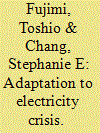| Srl | Item |
| 1 |
ID:
133222


|
|
|
|
|
| Publication |
2014.
|
| Summary/Abstract |
Electricity crises can spur improvements in electricity conservation that would be unachievable under normal circumstances. This paper investigates how businesses adapted to electricity shortages following the March 11, 2011, Great East Japan earthquake, tsunami, and nuclear disaster. In summer 2011, mandatory and voluntary electricity conservation measures affected nearly all of Japan, and peak hour electricity consumption was reduced by a remarkable 18% in the Tokyo region. Using statistical data from 14 business surveys conducted in 2011 and 2012, this paper identifies patterns with regard to type of adaptation, conservation requirements, economic sector, and timeframe. Results indicate that behavioral adaptations (e.g., reduction of illumination or air conditioning) were much more common than schedule adaptations (e.g., shifting production times) or hardware adaptations (e.g., installing energy-efficient devices or private generators). Adaptation patterns were very similar between mandatory and voluntary conservation areas. Manufacturing companies were more likely to implement schedule adaptations than other companies. Certain types of adaptations persisted into 2012, especially reduction of illumination and air conditioning, and installation of energy-efficient devices. These insights may be useful for informing electricity conservation policies in non-crisis contexts.
|
|
|
|
|
|
|
|
|
|
|
|
|
|
|
|
| 2 |
ID:
094305


|
|
|
|
|
| Publication |
2010.
|
| Summary/Abstract |
The purpose of this paper is to analyze Swedish households' willingness to increase their daily efforts to save electricity. The analysis builds on a broad theoretical framework, which embraces both economic and norm-based motivations in explaining household behavior. The paper pays particular attention to the role of information about the availability of different behavioral changes that can be undertaken at the household level. The empirical results are based on a postal survey that was sent out to 1200 Swedish households, and the econometric analysis is carried out within a so-called ordered probit framework. Our results indicate that costs, environmental attitudes and social interactions are all important determinants of electricity saving activities within Swedish households. We tested the hypothesis that information about available savings measures that is presented in a more concrete and specific way is more likely to affect (stated) behavior than is more general information, and the data collected support this notion. The paper ends by discussing some implications of these results for the design of future informative policy measures in the energy-efficiency field.
|
|
|
|
|
|
|
|
|
|
|
|
|
|
|
|